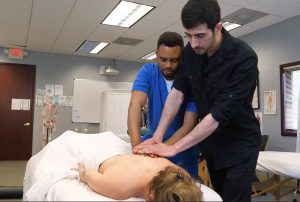Massage Relieves Allergies
April 23, 2015
By Gina Kraman
Allergy sufferers have another tool to fix their itchy, watery eyes, sinus pressure, and other seasonal discomforts without popping pills: massage.
Scientific studies of “psycho-neuro-immunology” document the connection between massage and healing, including allergies, explains Dr. Julie Kotiw. In addition to being a chiropractor, certified massage therapist, and registered yoga teacher, Kotiw teaches massage therapy classes at First Institute, a career training school.
She says, “Stress is a major trigger that can aggravate symptoms of allergies, among other ailments. Stress, which is anything that disrupts the body’s balance, can overwhelm the nervous system, which causes the immune system to not function at its highest level.”
Kotiw explains that allergic reactions happen when a sufferer’s immune system reacts to what are normally harmless substances in the environment. His or her immune system gets confused, and stress worsens this confusion:
“Massage therapy relieves stress from the nervous system, which helps the immune system function properly, so people can recover and feel better.”
Massage therapy works best on allergies with drainage issues. “Massage gets the circulation going, which relieves pressure caused from built-up fluid in the head and neck,” Kotiw says.
She’s quick to add that skin allergies wouldn’t be best treated with massage therapy, as the tactile stimulation of massage could irritate already sensitive skin. Massage can complement traditional medical practices.
She cites another expert, Dr. Candace Pert, who believes that “we could replace 90% of mainstream medicine with a weekly massage.”
Pert, Ph.D. and visiting professor at the Center for Behavioral Neuroscience at Rutgers University, expounded on the mind/body connection in the recent Massage Therapy Journal. She believes that the process of manipulating the skin through massage releases chemicals that program the whole body.
More on Massage Therapy:

